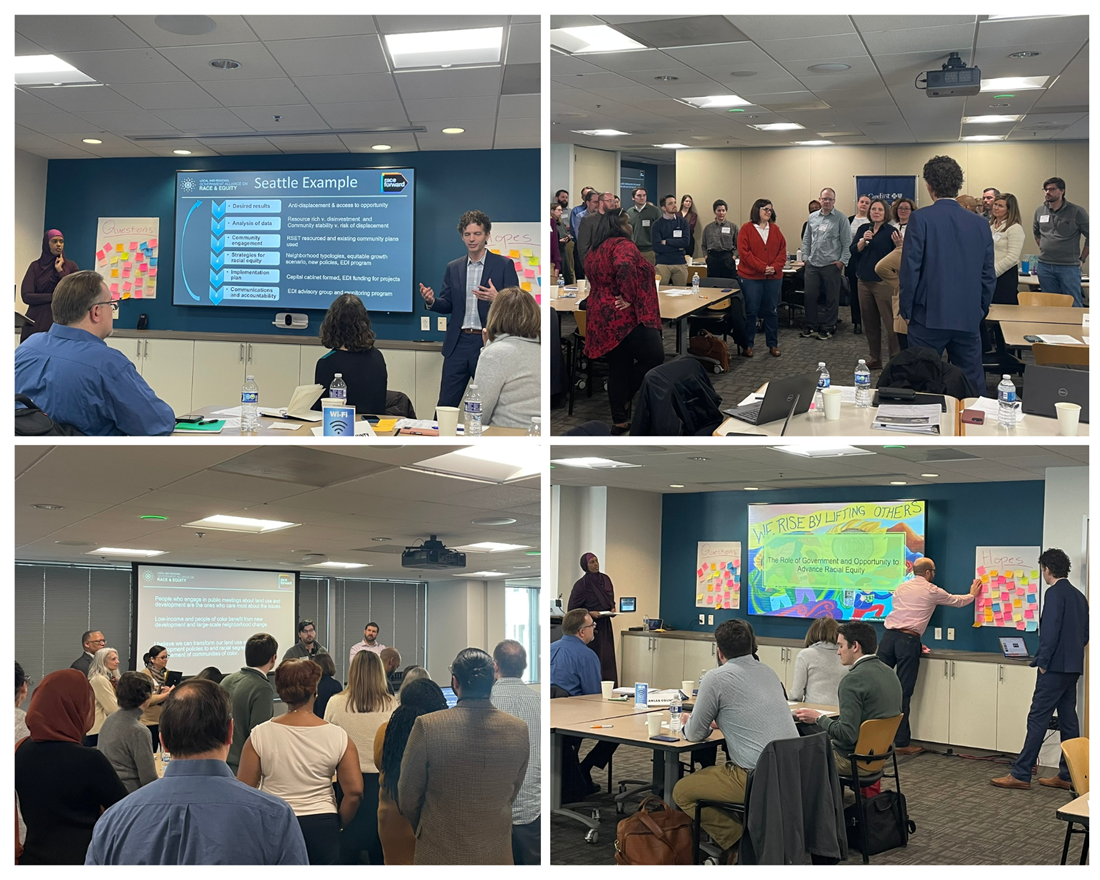At its March 2024 meeting, the COG Board of Directors approved Regional Principles for Equitable Development to help guide local governments in advancing equity through the updating and implementation of comprehensive plans. The principles were developed in coordination with COG's Chief Equity Officers Committee, Planning Directors Committee, and Housing Directors Committee. The principles, focused on both process and outcomes, will serve as a regional model and standard for local governments to implement equitable development processes and policies through land use planning and housing actions.
As part of COG’s focus on advancing equity and empowering local governments with the tools necessary to address structural racism, the Chief Equity Officers Committee drafted the principles to help practitioners center equity in policies and plans related to planning, zoning, and housing. According to the Uneven Opportunities Report: How Conditions for Wellness Vary Across the Metropolitan Washington Region, life expectancy varies by 27 years across the metropolitan Washington region. Disparities in housing and economic/other household resources are largely caused by decades of systemic and structural racism such as redlining practices, discriminatory housing policies, and displacement.
_Think_Regionally_(1).png)
The equitable development principles that were adopted at the COG Board of Directors meeting.
In November 2023, COG organized a “Planning for Equitable Development” regional workshop, which focused on fostering collaboration among 80 local government racial equity officers, planning directors, and housing directors to review local history and national best practices for racial equity, and then start drafting principles for equitable development. The principles were then shared and discussed at meetings of COG’s committees of racial equity, planning, and housing directors for additional input.
Fairfax County’s Chief Equity Officer Karla Bruce expressed during the March COG Board meeting that the workshop provided a platform for practitioners from different disciplines to “work together to develop a set of guiding principles that we hope could really serve as a regional model and standard for operationalizing equitable development through our processes, policies, and land use."

Racial equity officers, housing directors, and planning directors collaborated in the first session of the equitable development mini-series on February 29, 2024.
Director of Arlington County's Department of Community Planning, Housing and Development Samia Byrd delved into the ten principles in detail and shared some background on why these principles are significant for our region. She noted that since 2018, practitioners in the region have been on a journey to advance racial equity, although making it tangible has been challenging. She added, "comprehensive plans need to be deliberate in centering equity to realize equitable outcomes. Incorporate it early on if we want to see it as an outcome in our built and natural environments." Byrd reiterated the significance of the ten regional principles as a foundation and model for centering equity in localities' comprehensive plans.
COG members added to the conversation with COG Board of Directors Chair and District of Columbia Councilmember Charles Allen sharing his thoughts on the principles, "adopting regional principles will help empower our local governments to take deeper dives into considering equity in our local planning and it helps set the framework to consider when we are updating everything for our comprehensive plans and other goals."
City of Rockville Mayor Monique Ashton shared her excitement with this initiative and the progress the region has made. She said, “at the time where there are jurisdictions in our country that are going backwards, we are continuing to drive this forward.” She highlighted the City of Rockville's proactive approach of organizing trainings with Race Forward for all senior-level staff. Additionally, she emphasized the importance of re-evaluating policies to ensure equitable outcomes without inadvertently harming communities.
Throughout the discussion COG Board Members asked questions about the challenges of operationalizing the equity principles in localities. Bruce replied by saying, "I think setting the structure is so critical to being able to continue to challenge and advance equity work and, quite frankly, utilizing not only the voice of the community but the data, because being driven by data tells us to be the county that we would want to be and helps us close the gaps."
This initiative will continue with the launch of the Equitable Development In-depth Training Cohort, a four-part series that began in February and will run through May, in collaboration with Race Forward’s Government Alliance on Race & Equity (GARE). The equitable development mini-series will use the principles as a regional model and allow local government practitioners to learn how to incorporate them into comprehensive plans specifically around planning and zoning.
MORE: Read the Certified Resolution R13-2024 - Adopting Regional Principles for Equitable Development